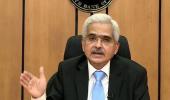.

While top economists are of the view that the Reserve Bank of India's Monetary Policy Committee (MPC) may not cut the repo rates, they also said it would be interesting to see the views of three new members and how they view the situation on inflation, growth and cast their vote.
It will be interesting to see whether the MPC's decision will be unanimous or divided as in the past.
Repo rate is the rate at which the RBI lends to the banks after taking into account inflation, economic growth, global and other factors.
An increase or decrease will have its impact on the commercial bank's lending rates.
The three day MPC meeting began on Monday and the decision will be announced on Wednesday by RBI Governor Shaktikanta Das.
The central government appointed three new members to the MPC: Professor Ram Singh, Director, Delhi School of Economics, University of Delhi; Economist Saugata Bhattacharya; Dr Nagesh Kumar, Director and Chief Executive, Institute for Studies in Industrial Development, New Delhi.
They replaced Dr Shashanka Bhide, Honorary Senior Advisor, National Council of Applied Economic Research, Delhi; Dr Ashima Goyal, Emeritus Professor, Indira Gandhi Institute of Development Research, Mumbai. Professor Jayanth R Varma, Professor, Indian Institute of Management, Ahmedabad.
The six member MPC is headed by RBI Governor Das; there are two other members are officials of the central bank.
Interestingly at the last MPC meeting held in August, Professor Varma and Dr Goyal had voted against retaining the policy rate at 6.50% and wanted the rate to be reduced by 25 basis points or to 6.25% and change the stance to 'neutral'.
"It would be interesting to see how the three new members view the situation on inflation and growth and cast their votes. The narrative today is different from what it was ever since the Israel-Iran conflagration began last week," Madan Sabnavis, Chief Economist, Bank of Baroda said.
"It does look like that as there is looming uncertainty the outlook will be conservative. Further with inflation likely to be in the 5% plus range for the next couple of months given the dilution of the base effect which yielded lower inflation numbers, a status quo is likely to be the view this time even for the new members," Sabnavis added.
On her part, Madhavi Arora, Lead Economist, Emkay Global Financial Services said the MPC has a lot to process.
"While it's too early to form an opinion on the policy bent of the new external members, there now appear to be some cracks in the domestic macro fundamentals," Arora said.
According to Arora, the existing economic slack has been exerting disinflationary pressure on core prices, even as food inflation stays somewhat untamed.
"Meanwhile, the commencement of the US Federal Reserve's cut cycle with a bumper 50 bps cut has opened space for emerging markets, including the RBI, to start easing. However, the recent upside surprises on US growth, labour market, and inflation may still reignite the underappreciated risk of 'high for long' scenario," Arora said.
"The fluidity of global narratives in conjunction with comfortable banking liquidity, easy domestic financial conditions on net, incipient weakness in growth, noisy food inflation, and the still-elusive 4% inflation target and others, would make it tricky for the RBI to find a balance in its policy biases, Arora remarked.
"While the upcoming policy may not see any rate action, a stance change to 'neutral' (from 'withdrawal of accomodation') with stress on being 'actively disinflationary' would be MPC's best bet to prep ground for start of a shallow easing cycle, possibly from December," Arora said.
Dhiraj Relli, MD and CEO, HDFC Securities is of the view that RBI may hold the policy rates at 6.50% for the 10th consecutive time, but might change its stance to 'neutral'.
"The latest near-term macro data remains mixed, and early signs of slowdown are on the horizon. Also, inflation is nearing its target on a four-quarter rolling basis, the closest it has been in 22 quarters.
"This may mean a change in the stance to neutral from 'withdrawal of accommodation' and there is some chance that the RBI may hint at being open for a rate cut based on the data that comes in from now till the next meet," Relli added.
"This is also likely given the lower than forecast first quarter GDP growth and the likely sizeable undershooting in the second quarter CPI inflation print as well," Relli explained.
"Inflation forecast may be lowered by 15 to 20 bps while GDP forecast may be maintained.
"The October meeting would also be the first post the inclusion of three new members to the Monetary Policy Committee, who might support the RBI's broader view for the time being."
Venkatachari Jagannathan can be reached at venkatacharijagannathan@gmail.com









